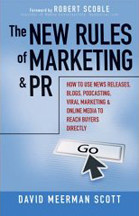With not much more than a single post, David Meerman Scott has single-handedly generated some much deserved buzz over his new book: The New Rules of Marketing and PR .
.
How did he do it? By employing the right mix of social networking, blog marketing, and smart content that has always graced the pages of his blog and other books. This time, by recognizing and thanking direct and indirect contributors in a post, he has well more than 100 bloggers talking about his book (including me).
It's smart stuff and seemingly much easier than the process employed when I contributed to Beyond Generation X by Claire Raines. Ten years ago, Raines and I had connected on a forum, where she was soliciting some insight into managing Generation X. Having contributed to several books, I knew the process well enough. We connected briefly, I penned a brief passage to specification, she published, and one day (after I forgot all about it), I received a copy in the mail. The end, without any real way to assist in the marketing of the book.
by Claire Raines. Ten years ago, Raines and I had connected on a forum, where she was soliciting some insight into managing Generation X. Having contributed to several books, I knew the process well enough. We connected briefly, I penned a brief passage to specification, she published, and one day (after I forgot all about it), I received a copy in the mail. The end, without any real way to assist in the marketing of the book.
How very different it is today. Most of the contributors to Scott's book aren't exactly sure what they contributed because they had already published their work on their respective blogs. But because of social media being what it is, I know more about it than I ever did about Raines' book. I know when it will be published, how to purchase extra copies, and can even link to it using Amazon's associate program (Gee, I hope he included a "good idea" as opposed to a "don't do this" idea. Ha!).
I also know that Scott has given me (and others) a reason to write about the book and a reason to review it in the weeks ahead. Not everyone will, just like not everyone will list all the contributors on their blogs (I will in the comments as that works better for me). Yet, enough will (and have) to give his book some early momentum, making the marketing as interesting as the book.
His posting also comes at the right time because more and more people are trying to pin down some secret blogging formula and, personally, I'm just not convinced that one exists.
It seems to me that most blogs enjoy a mix of social networking, subscriptions, practical tips and tools (even some widget bling), and above all, content, content, content as iffect.net recently wrote up this weekend.
It is one of the best posts I've seen on the subject, pinpointing what most of bloggers agree on: content is critical. Where some disagreement seems to exist is on the rest of it: what is right mix of social networking, SEO writing, etc.
I think the evidence clearly supports that content is where the emphasis needs to be. However, one might ask where that leaves SEO, links, social networks, and even The New Rules of Marketing & PR, which clearly demonstrates there is a lot to be said for several aspects of blogging beyond content.
The closest I've seen to anything making real sense is from Seth Godin, who when talking about analytics reminded everyone you have to ask yourself: "Why do you have a site? What's your goal? Is it to sell something? To receive email? To spread an idea? Whatever it is, you can probably measure it. And measure it you should."
Whereas some people might shrug this off as too vague, it's perfectly presented in that every site or blog might require its own strategy depending on what your measurable goals are, especially if you are hoping for any type of sustainability.
It's relatively easy to trade links and build short-term networks, but at the end of the day, the content will decide whether or not people will come back; just as your measurable objectives will determine if your site or blog is successful or not, despite links, traffic, or any other measure.
The same will be said for Scott's newest book. The blog posting — a combination of online marketing, social networking, and gracious crediting — will certainly give it legs on the front end. Long-term sales, however, will depend on the content. Knowing a bit of Scott's other work, it seems very likely he will deliver on that as well.

How did he do it? By employing the right mix of social networking, blog marketing, and smart content that has always graced the pages of his blog and other books. This time, by recognizing and thanking direct and indirect contributors in a post, he has well more than 100 bloggers talking about his book (including me).
It's smart stuff and seemingly much easier than the process employed when I contributed to Beyond Generation X
How very different it is today. Most of the contributors to Scott's book aren't exactly sure what they contributed because they had already published their work on their respective blogs. But because of social media being what it is, I know more about it than I ever did about Raines' book. I know when it will be published, how to purchase extra copies, and can even link to it using Amazon's associate program (Gee, I hope he included a "good idea" as opposed to a "don't do this" idea. Ha!).
I also know that Scott has given me (and others) a reason to write about the book and a reason to review it in the weeks ahead. Not everyone will, just like not everyone will list all the contributors on their blogs (I will in the comments as that works better for me). Yet, enough will (and have) to give his book some early momentum, making the marketing as interesting as the book.
His posting also comes at the right time because more and more people are trying to pin down some secret blogging formula and, personally, I'm just not convinced that one exists.
It seems to me that most blogs enjoy a mix of social networking, subscriptions, practical tips and tools (even some widget bling), and above all, content, content, content as iffect.net recently wrote up this weekend.
It is one of the best posts I've seen on the subject, pinpointing what most of bloggers agree on: content is critical. Where some disagreement seems to exist is on the rest of it: what is right mix of social networking, SEO writing, etc.
I think the evidence clearly supports that content is where the emphasis needs to be. However, one might ask where that leaves SEO, links, social networks, and even The New Rules of Marketing & PR, which clearly demonstrates there is a lot to be said for several aspects of blogging beyond content.
The closest I've seen to anything making real sense is from Seth Godin, who when talking about analytics reminded everyone you have to ask yourself: "Why do you have a site? What's your goal? Is it to sell something? To receive email? To spread an idea? Whatever it is, you can probably measure it. And measure it you should."
Whereas some people might shrug this off as too vague, it's perfectly presented in that every site or blog might require its own strategy depending on what your measurable goals are, especially if you are hoping for any type of sustainability.
It's relatively easy to trade links and build short-term networks, but at the end of the day, the content will decide whether or not people will come back; just as your measurable objectives will determine if your site or blog is successful or not, despite links, traffic, or any other measure.
The same will be said for Scott's newest book. The blog posting — a combination of online marketing, social networking, and gracious crediting — will certainly give it legs on the front end. Long-term sales, however, will depend on the content. Knowing a bit of Scott's other work, it seems very likely he will deliver on that as well.
















